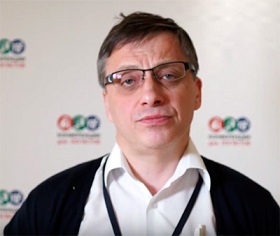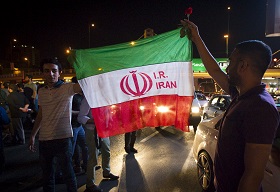In the current extremely complicated international situation, Russia has to look for new trade partners. However, it is well known that the new is often the well-forgotten old. On November 23, 2015, President Vladimir Putin paid a state visit to Tehran, where Russia and Iran will seal numerous trade and industrial agreements and projects that are aimed at expanding and strengthening trade between the two countries. The visit has been preceded by many days of work carried out by various intergovernmental commissions in Russia and Iran, as well as by national companies seeking broader access to the Iranian market. Below, Alexander Sharov, Director of Rusiranexpo State Corporation, speaks about the visit and the potential of bilateral economic relations.
In the current extremely complicated international situation, Russia has to look for new trade partners. However, it is well known that the new is often the well-forgotten old. On November 23, 2015, President Vladimir Putin paid a state visit to Tehran, where Russia and Iran will seal numerous trade and industrial agreements and projects that are aimed at expanding and strengthening trade between the two countries. The visit has been preceded by many days of work carried out by various intergovernmental commissions in Russia and Iran, as well as by national companies seeking broader access to the Iranian market. Below, Alexander Sharov, Director of Rusiranexpo State Corporation, speaks about the visit and the potential of bilateral economic relations.
The Joint Comprehensive Plan of Action (JCPOA) adopted under an agreement between Iran and the P5+1 group on July 14, 2015 would lift economic sanctions against Iran if the latter complies with several measures to curtail its nuclear programme. Has this made foreign companies more active in Iran? And if so, the companies of which states?
It has to be noted that representatives of various foreign companies (between 80 and 150 people from France, Italy, Poland, Austria, Germany, etc., actually came earlier, in 2013–2014) took an active part in business forums and delegations in Iran prior to July14. After the July 14 agreement, the number of companies interested in Iran increased by three or four times. Delegations are now led not by deputy ministers, but by ministers of economic development or vice prime ministers, sometimes even by presidents. For example, the President of Austria led an official delegation to Tehran. Germany has always shown a keen interest in the country. Trade in equipment between German and Iran amounts to around 2 billion euros. Today, the German–Iranian Chamber of Industry and Commerce has about 2,400 members. And that number could increase. For the sake of comparison, the Russian–Iranian Business Council, the Russia–Iran Chamber of Trade and Industry and other alternative associations have 800 member companies at most. Italy is at about the same level as Germany, with a trade turnover of about 2 billion euros. But Italy is experiencing serious difficulties in trade with Iran because of the large-scale sanctions on sending containers. The Italians, however, are managing to cope with that problem by bringing in road transport. Finland has a good record, with the Finnish engineering company Outotec winning a tender in 2014 to supply equipment for mining enterprises in Iran. Spain is also well represented in the country. Other countries – France, Romania, Poland, the Czech Republic, and Ukraine – have fewer assets in Iran. Sanctions are the main obstacle in the way of fully fledged cooperation of these countries.
Is the business climate in the country changing? And if so, is it changing for better or worse?
The business climate in the country should be changing, but it isn’t.
Why?
Office rental prices are not growing, although all the hotels are full. Taxi and restaurant prices have gone up slightly. Iranian companies are operating fairly old assets and connections that they know well. The attitude to European, Korean, Japanese and Russian companies is about the same. It does not make much difference for Iranian businesspeople whether they cooperate with Germany, Russia or Korea. They are waiting for large-scale investments in new offices, representative missions where the role of Iranians would boil down to banal banking services and other not very taxing and pleasant jobs. This was the case with petrochemical plants in the summer of 2015; today they are trying to lure investors and support new initiatives that would benefit them. Any company with sufficient start-up capital has a free hand to gain a foothold on the Iranian market and work there independently. Those who wait for intergovernmental agreements will be the losers. This applies both to Russia and Germany. Iran has no favourites.
What can be the impact of lifting the sanctions on Iranian business? Could it make national companies less competitive?
In spite of sanctions, Iran’s import duties are through the roof – between 20 and 70 per cent, so they are quite relaxed about the lifting of sanctions. They say they want to join the WTO, but judging by their import duties, the statement is groundless. So, Iran expects that, with the lifting of sanctions, the flow of payments to the West will increase. But we shouldn’t get our hopes up on that front, because such payments and transactions already exist with the help of Turkey and the United Arab Emirates, but Iranian buyers have no disposable money. Iranian banks accept deposits at 3 per cent per month, i.e. at domestic prices. For the second year in a row, the exchange rate has hovered around 33,000–35,000 rials to the dollar. This is clearly a very high rate; money is too expensive and the Iranian people hope that money will become available domestically so that they can buy things. However, the number of facilities under construction has not appreciably increased since the summer of 2015, and warehouses are full of sawn timber, building materials and rolled metal. Two of Iran’s biggest car-making factories – Iran Khodro and SAIPA – have enough rolled metal to last them until 2016. Iranian businesspeople are at a loss. They don’t know what to do in November and December 2015, even if the sanctions are lifted.
Sanctions may be lifted as early as the end of the first quarter of 2016. What are Russian companies doing in this regard? Do they have plans to break into the Iranian market or expand existing businesses there?
Yes, they have plans. However, a number of companies somewhat rashly believe that positive results can be achieved through intergovernmental channels. Unfortunately, this is not the case. Those who are already working in Iran are looking for their own sources of money to finance their goals and tasks. This is the right way. With the exception of Tempbank and Mir Business Bank, Russian banks still do not work with Iran. In order to invest, businesspeople, at their own peril and without external crediting, open small-scale wholesale trade warehouses to sell pipes, for example. In 2014, Russia supported non-commodity export. But no longer. Every EU country compensates Western companies for 95 per cent of their export costs, but Russia does not.
The 12th session of the Permanent Russian–Iranian Commission for Trade and Economic Cooperation was held on November 10–12, 2015. What were its key decisions? What prospects do they open up for Russian companies?
In certain narrow circles, the Commission was aptly dubbed “the club of losers”, as firms that do real work in Iran try to give it a wide berth. Its meetings are largely declarative. Even so, there have been some positive shifts in the work of Zarubezhneft, Russian engineering companies, and the repair and modernization of the Ramin Power Plant. The Iran–Russia commission reviewed the results in all areas, but none of those present were willing to make high-profile statements or share in-house information, because they wanted to avoid creating excessive competition and leaking information to the West. The Commission’s work is covered widely by Russian and foreign media.
Vladimir Putin is due to visit Teheran on November 23, 2015. What can emerge from that visit in terms of economic cooperation between the two countries?
During the visit, a number of major projects that were not presented at the Commission meeting will be unveiled. Agreements are in the pipeline with Rostec, Zarubezhneft and other companies. The parties will sign project agreements during President Putin’s visit, as well as during the subsequent visit of the Ministry of Industry and Trade of the Russian Federation delegation led by Denis Manturov. That is a major achievement. However, the trickiest issue is still financing projects and bank cooperation, which calls for thorough analysis and close interaction between the sides.
Prepared by Elena Alekseenkova, RIAC Program Manager, and Maria Gurova, RIAC Website Editor.






